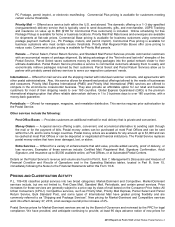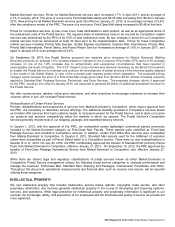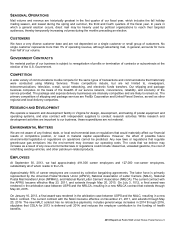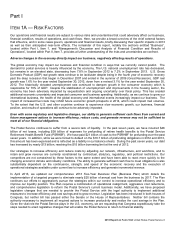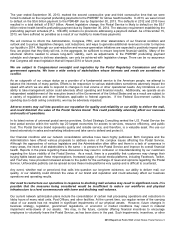US Postal Service 2013 Annual Report Download - page 15
Download and view the complete annual report
Please find page 15 of the 2013 US Postal Service annual report below. You can navigate through the pages in the report by either clicking on the pages listed below, or by using the keyword search tool below to find specific information within the annual report.2013 Report on Form 10-K United States Postal Service 13
We believe our estimated accruals for such claims are adequate, but if actual experience in the number of claims, and/or
severity of claims for which we are retaining risk increases, required accruals could materially differ from our estimates
and adversely affect our financial condition and results of operations.
The potential liability associated with existing and future litigation against us could have a material adverse
effect on our business, results of operations, financial condition, and cash flows.
We are subject to various legal proceedings and threatened legal proceedings from time to time. Any litigation, regardless
of its merits, could result in substantial legal fees and costs being incurred by us. Further, actions that have been or will be
brought against us may not be resolved in our favor and, if significant monetary judgments are rendered, we may not have
the ability to pay. Such disruptions, legal fees, and any losses resulting from these claims could have a material adverse
effect on our business, results of operations, financial condition, and cash flows.
A failure to protect the privacy of information we obtain from customers could damage our reputation and result
in a loss of business.
We have invested in and employ a variety of technology security initiatives aimed at protecting organizational information,
as well as customer information. As one of the government agencies most trusted by the American public, protecting the
confidentiality of data that we obtain is paramount to us. However, should our information technology security initiatives
not fully insulate us from a security breach or data loss, our reputation could be damaged resulting in an adverse effect on
our operations and financial results. Moreover, unlike other non-governmental entities in our industry, the Postal Service
must abide by the Privacy Act of 1974, which restricts how the Postal Service can collect, use, maintain, and disseminate
personally identifiable information, and prescribes civil and criminal penalties for non-compliance.
International conflicts or terrorist activities and the effects of these events may have adverse impacts on
business operations or our financial results. In addition, we are subject to the risk of biohazards and other
threats placed in the mail.
We are exposed to the impacts of international conflicts and terrorist activities on the United States, global economies in
general, and the transportation industry in particular. In addition, we are particularly subject to the risk of biohazards and
other threats placed in the mail. Although we have implemented extensive emergency preparedness measures to keep
the mail, employees, and customers safe from harm due to biohazards or other threats that could be introduced into the
mail, this risk cannot be completely mitigated. If new threats were to arise and measures were not sufficient to contain or
mitigate the threat, services could be disrupted. This could adversely affect mail volumes and revenue and require
substantial expenditures to address the new threat, thus adversely affecting our operations and financial results.
We may be adversely impacted by the legal or regulatory responses to actual or perceived global climate change.
Concerns about climate change, particularly global warming, have resulted in significant discussions in the scientific
community, domestic and international governments, and environmental organizations about the effects of greenhouse
gases on the environment. These discussions could result in new laws or regulations that regulate greenhouse gas
emissions into the environment and, as a result, our operating costs may increase. The costs that we believe may
increase as a result of any new environmental laws or regulations could include: diesel fuel, unleaded gasoline, retrofitting
existing vehicles, and other petroleum-related products, such as tires. In addition, utility costs associated with the
operation of facilities may increase as a result of new environmental laws and regulations. Finally, because we also use
contracted carriers to transport the mail, we anticipate that increased operating costs for these independent carriers,
including increased costs resulting from new laws or regulations, may ultimately be passed through to the Postal Service.
We are also subject to risks and uncertainties that affect many other businesses, including:
Market acceptance of new product and service initiatives;
Adverse weather conditions or natural disasters, such as hurricanes, which can damage property and disrupt
operations;
Widespread outbreak of an illness or any other communicable disease, or any other public health crisis; and
Changes in interest rates.



